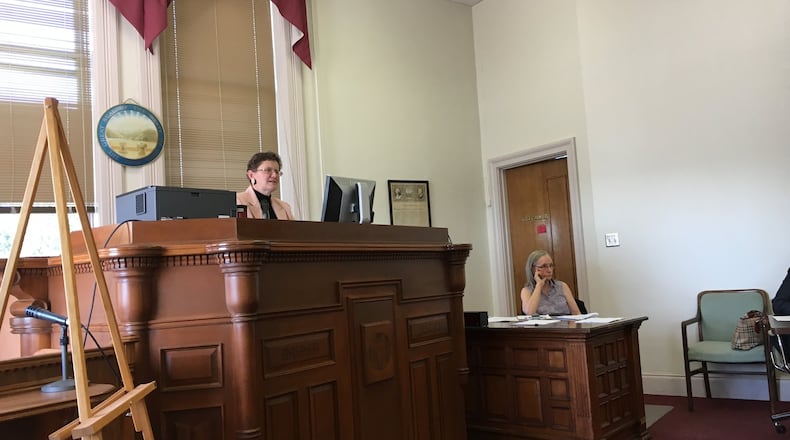“For some of those clients, the only real encouragement they have comes from us,” Wilkerson told the Journal-News. “A lot of them don’t have much of a support network. A lot of them have worn out their close relationships through drug use.”
RELATED: Family drug court gets $2.1 million boost
In the wake of the opioid epidemic that has a firm grip on Butler County, and with many adoptions occurring because of parents who can’t stay off drugs, Children Services, the Juvenile Court and mental health and addiction board decided to resurrect the family drug court that was stopped in 2012 when funds dried up.
The court meets once a week on Thursdays and all of the clients come together with the magistrate, her coordinator Jolynn Hurwitz, the juvenile court prosecutor, a social worker, representatives from the various agencies where the clients are in treatment and a couple attorneys representing clients and the children.
Hurwitz is on top of every detail in the clients’ lives, and she fills in the group during an hour-long conference before the clients come into court. She is so connected and invested, in such a short period of time — the court officially opened in June — she even offered to drive one of the clients to a visit with her child.
On this first docket there is a married couple, a pregnant woman and two mothers.
Wilkerson speaks with each client individually, asking how they are doing, what’s new in their life, how their children are and she celebrates accomplishments.
The lone father in the group told Wilkerson his priority is to get another job now that he is sober, but he doubts he’ll get one as good as the one he lost.
“Maybe you’ll get something better,” Wilkerson told him. “You don’t know, there might be something better, there might be something waiting for you that you haven’t even dreamed of yet. Recovery brings a lot of things to you that you don’t expect.”
On Thursday everyone got two “draws” from a fish bowl filled with folded up sheets of purple — the color of sobriety — and turquoise paper, because they were individually compliant with the program and everyone in the group followed the rules. A couple of people got a third slip, one mother because she has been sober for more than 90 days.
The papers have numbers on them and the clients either get inspirational messages from the judge’s prize box or something more tangible, the 90-day-sober mother got a frosty can of Coke, which was appreciated in the hot courtroom.
Each client also fills out a construction paper circle — which are then posted on a bulletin board in the court — noting something they did nice for someone, something nice someone did for them or something positive.
“There are silly reasons we do all these things, it’s actually based on science,” Wilkerson told a new mother who was accepted into the program that day. “It’s a brain science thing, if somebody does something nice for you it makes you feel good, it changes the chemicals in your brain and it helps heal some of the stuff, trauma or substance abuse that has caused your brain to change… When you do something nice for somebody else you get twice the benefit out of it.”
The clients also have weekly assignments they must complete.
The young pregnant woman brought a poster in with pictures of her son. She told the magistrate all about her son, including he likes ketchup on everything.
MORE: Former addict talks about recovery
Wilkerson asked her what she has learned.
“I lost everything in 15 minutes,” she said. “I wasn’t as strong as I thought I was, you really do have to avoid old people and places.”
Eventually the court plans to expand to help 45 to 60 people.
Darryle Short, who is part of the team from Sojourner Recovery Services, told the Journal-News he was in these clients’ shoes 15 years ago when he was taking every drug on the street, until he met some judges and police in Middletown who changed his life.
He had high praise for the new program.
“Coming from an addictive world, you fear the police, you fear the judge, you fear the court system because you think they are so judgmental,” Short said. “But then you get to experience Magistrate Wilkerson, her passion and how she talks to the clients, she gets it, she truly gets it… The way she embraces you, words can’t describe how the clients respond to that, they gravitate to that.”
About the Author
